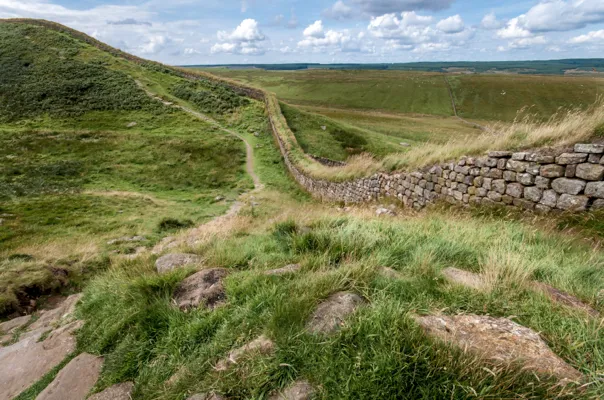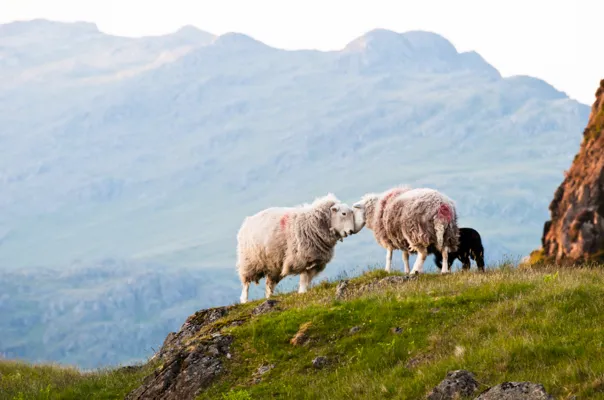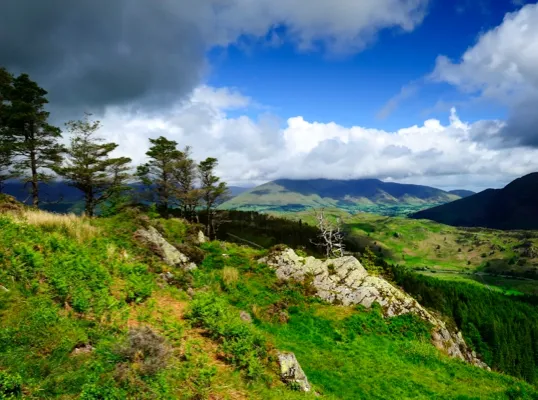"Come-bye, Floss, come-bye. Come-bye, Tan, come-bye.” On the steep, tussocky field behind his farmhouse in Matterdale, Cumbria, James Rebanks is putting two border collies through their paces. A flock of Herdwick sheep trots uphill as the dogs circle and crouch around them; the sheep are so tightknit that their pale grey heads seem to rock in unison.
“They make it look easy because they’re such good dogs,” says the farmer, whose Twitter account starring his sheepdogs and their pups (@herdyshepherd1) has more than 70,000 followers. “You’re not a shepherd if you don’t have a good dog. It’s that simple.”
The straight-talking sheep farmer and author of The Shepherd’s Life, a poetic portrait of his Lake District hill farm, is staring across lumpy upland fields towards the Helvellyn range on the skyline. His work is intimately tied to the land and the seasons, as his sheep move between the fell and valley several times a year – coming down for winter in November, and going back with their lambs in May, as soon as the lambs are strong enough to follow their mothers and survive the tough condition up there. “In the fells here, there is no grass and too high a risk of bad weather until the start of April, so lambing is timed carefully for then,” says James. “The mothers teach the lambs their place on the fells, and they become hefted.”

Shearing starts on many UK farms in May but Herdwicks need the protection of their fleece from harsh upland weather until high summer, so James does not clip (local dialect for shearing) his until July. To do this, he and his dogs will play their part in one of the most tiring tasks of the year: the summer fell gather, when James’ fell-going flock must be brought off the hillside. Due to the ancient system of commoners’ rights that exists here, the task is more complicated than it sounds.
James and nine other farmers have the legal right to graze sheep on Matterdale Common, the rugged hills north of Helvellyn. “There are no fences up there, so I can’t gather my sheep without my neighbours’ collaboration. If it’s going to be hot, we start at 4am so we can get the worst work done before the dogs get exhausted in the sun. We all know our jobs.”
The farmers and their dogs walk (and quad-bike) their way around and over the mountain, encircling it like pincers. Four hundred sheep are brought down to the fell-gate pens and separated into flocks, using nothing more hi-tech than a sorting gate and a stick. James then spends three hours walking his flock home. For the sheep, there’s the reward of lusher grass on the ‘in-bye’ land next to the farmhouse. For the shepherd, the real work is about to begin.

“I spend about a week clipping my sheep,” James says. “I take my time. I’m proficient, but I’m not like those wiry, tough lads who can clip 400 sheep in a day.” He remembers how, as a young farmer working alongside his father and grandfather, he struggled to get a grip on this essential shepherding skill. “I used to get a terrible bad back because I didn’t bend my knees properly. It was just exhausting. And it was all tied up with a lot of macho nonsense about trying to keep up with my dad.”
Family values
James’s father Tom Rebanks died last year from cancer, the recurrence of which overshadows the end of The Shepherd’s Life. The book is dedicated to his father and his late grandfather, William Hugh Rebanks, both of whom, in the 1960s, bought the land that James now farms. He credits both men with passing on the instincts and skills that make a good shepherd. “In theory, anyone can be taught how to do it,” he says. “But so much comes from growing up among it, the values that you learn and the people that you know.”
Herdwick fleece was once a valuable asset to Lakeland farmers. Market towns such as Kendal – whose motto Pannus mihi panem translates as “Wool is bread to me” – were built on the wealth generated by the thick, weatherproof wool that was used to make Hodden Grey coats for the army. Its function now superseded by the likes of fleece and Gore-Tex, the fleece is almost worthless. “We get the wool off for welfare reasons,” James explains. “It’s really uncomfortable in the heat. And if flies lay eggs on it, sheep can get eaten alive by maggots.”
While a sheep is never going to enjoy being sheared, a skilled clipper has hold of the animal for less than a minute. “Clipping is a combination of physical skill and a deep knowledge of how sheep move and bend,” James says. “If I’m doing it right, the sheep won’t struggle. It’s being manipulated in a way that works.”
It’s ewe and me, kid
The connection between James and his animals is profound, particularly at lambing time, where a shepherd makes a huge difference because it is life or death work. “When you’re helping them to give birth, it can be quite intense,” he says. “With some of my older ewes, I think they know that I can help them, because I’ve done it before – they don’t try so hard to get away when I try to catch them. We both know we’re in it together.”

As a breeder of pedigree Herdwicks, James cherishes his breeding ewes. But he’s even more attached to the chosen few tup lambs that he nurtures for the autumn sales, where he makes a big share of his annual farming income by selling his best young tups (rams) to other shepherd to improve their flocks. “Breeding good tups is how we earn our status as shepherds,” he says. “I’m addicted to it.” Two years ago James sold a tup for £5,500 – which was, at the time, the highest price ever achieved for a Herdwick. For this son and grandson of shepherds, earning a double first from Oxford in his 20s (having left school at 15) and writing a bestselling memoir in his 40s could not top the achievement of breeding a record-breaking tup.
“What matters to my friends and family is whether or not I’m looking after my father’s and my grandfather’s land as well as they did,” he says. “Am I a useful member of my community when we gather the fell? Am I good with my sheepdogs? Do I breed good sheep? At the moment I’m doing OK with my flock, so I can look the other shepherds straight in the eye.”
Rachael Oakden is a freelance writer who lives in the Eden Valley, Cumbria.
Images ©iStockphoto.com